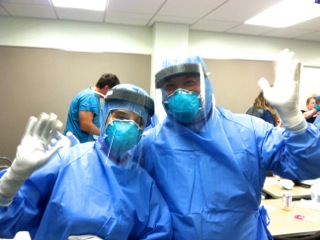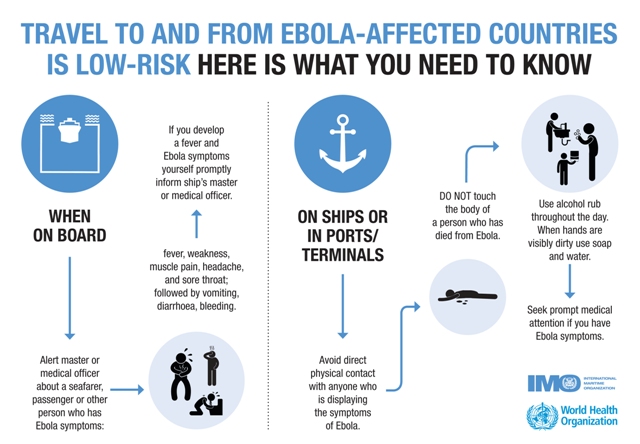Preventing Ebola in the Maritime Industry

By Kayla Turner
The Ebola epidemic has been flooding headlines and instilling fear into the international community for months. MarEx spoke with Dr. Raymond Jarris, Medical Doctor and President at MD Solutions International in Seattle, Washington to identify certain spread risks and prevention tactics, specifically for the maritime industry.
“First it is important to note that experts are learning daily, and changing recommendations frequently. However, positive progress is being made in the U.S. in containing risks in the maritime industry and the population nationwide,” said Dr. Jarris.
For travelers outside of West Africa, the risk of infection is very small. The international community has begun screenings at airports. There are still lessons to be learned in screenings for mariners, ship passengers, and others – like longshoremen. Dr. Jarris notes, “There is a low likelihood occurrence with huge potential impacts for the maritime sector. Intelligent management is critical.”
As commercial vessels have a lot less crewmembers than a cruise ship, for example, one can’t afford to be  isolated without impacting shipping operations. Mariners need to be educated on not only Ebola, but other international risks including MERS. Seminars are being held, workgroups should be formed, and education needs to be constant.
isolated without impacting shipping operations. Mariners need to be educated on not only Ebola, but other international risks including MERS. Seminars are being held, workgroups should be formed, and education needs to be constant.
Pictured (right): Drs. Ansari and Mar during PPE training drill at Swedish/Ballard.
Dr. Jarris believes that these lessons learned with the current outbreak should be the model to use going forward. Stakeholders need to answer the following questions: How do we do business differently? How do we crew ships differently? How do we manage longshore sites? How do we look at stowaways? How do we manage mariners who are doing air travel? “We need to protect operations, the industry and the personnel,” confirms Dr. Jarris.
“Shipowners need to invest in vaccinations for crew – just even as basic as the flu shot. Mariners need to be educated on hand and cough hygiene aboard ships. Overall, the maritime industry as a whole will be more productive once we start managing basic viral and bacterial infections aboard vessels, and amongst crewmen” he said.
Dr. Jarris notes that our critical lesson in all of this: Don’t panic! The U.S. has seen one fatality, and in the last few days, WHO officially declared the Ebola outbreak in Senegal over and commends the country on its diligence to end the transmission of the virus. On October 20, Nigeria is now also considered free of Ebola transmission.

The USCG continues to monitor the threat and work to prevent the possible waterborne entry or spread of the virus via U.S. ports. An Ebola Crisis Action Team has been stood up at USCG Headquarters and is conducting a comprehensive review of USCG policy to provide clarifying guidance to port stakeholders, and they will release additional guidance as necessary.
Any suspected Ebola case in the maritime environment will be considered an incident of significant national interest, so timely notification to the CDC and the USCG is vitally important, and will help ensure the most appropriate coordination between the CDC, USCG, and other federal, state, and local agencies.
Vessel/facility owner/operators, and local stakeholders, should be aware of the following:
• Vessel representatives are reminded that 33 CFR 160.215 requires the owner, agent, master, operator, or person in charge of a vessel to immediately notify the nearest Coast Guard Sector whenever there is a hazardous condition aboard the vessel. An ill person on board may constitute a hazardous condition and should be reported. Facilities that encounter similar conditions are strongly recommended to report this to the Coast Guard.
• Vessel representatives are also reminded that they are required to report sick or deceased crew or passengers within the last 15 days to the CDC under 42 CFR 71.21.
• The Coast Guard will continue to review all Notice of Arrivals to determine if a vessel has visited a country impacted by an Ebola virus outbreak within its last five ports of call. Local Coast Guard Sector personnel may reach out to ship’s agents of those vessels that have visited one of these countries, to affirm their understanding of the reporting requirements outlined in both 42 CFR 71.21 and 33 CFR 160.215.
• For vessels that have visited a country impacted by Ebola within its last five ports of call, a vessel’s owner or operator is highly encouraged to determine how long each individual crew member has been on that vessel. This should include whether or not the crew member visited countries currently impacted by Ebola within the 21 days prior to embarkation. While this information is not required under current Coast Guard regulations, having reliable data available to document this history will help reassure the public and port stakeholders and facilitate cargo operations.
• It is recommended that local industry stakeholders, in collaboration with their Coast Guard Captain of the Port do the following:
Continue to review and be familiar with section 5310 Procedures for Vessel Quarantine and Isolation, and Section 5320 Procedures for security segregation of Vessels in their Area Maritime Security Plan.
Continue to review and be familiar with their Marine Transportation System Recovery Plan.
Consider conducting a table top exercise to plan and address items such as an evaluation of how to handle a vessel arrival with a suspected Ebola case (allow to berth?, keep it at anchorage?, etc.), what steps need to be considered if a medical evacuation is needed, and, possibly how a ship would be decontaminated in order to commence cargo transfers? Please keep in mind that this is not an all-inclusive list. These are just a couple examples to start with. It is recommended that the COTP and local industry stakeholders go through other scenarios as they see fit.
For all Ebola-related information – including symptoms, treatment, and current news, please visit http://www.cdc.gov/vhf/ebola/index.html.
